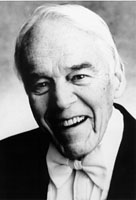

In the soaring darkness of Finney Chapel, the reflected glow from the nearly 400 singers and musicians assembled on stage lit the enraptured faces of an audience of over 1200. On the podium was maestro Robert Shaw, founder of the Robert Shaw Chorale and Music Director Emeritus of the Atlanta Symphony Orchestra.
Shaw was leading the Oberlin College Choir, the Oberlin Musical Union, an alumni chorus of 100, and the Oberlin Orchestra in a November concert tribute to another choral conductor of international stature and enduring legacy--the late Robert Pratt Fountain.
As the final ringing notes of Stravinsky's Symphony of Psalms faded away, the 80-year old conductor wiped his face, nodded to his performers, and turned to receive the thunderous applause of hands and feet that is Oberlin's unique tribute for performances of greatness.
The concert was part of a four-day series of events--A Tribute to Robert Fountain--celebrating the life and work of one of Oberlin's most distinguished pedagogues. Alumni from 28 states and Israel joined Oberlin students, faculty, and Fountain family and friends to share loving memories of the man and his music. Designed to elicit memories, the tribute, held in conjunction with the Division of Music Education's alumni reunion [See "75 Years of Music Education: A Reunion" in the "Alumni News & Notes" section of this issue], also created new ones. Proceeds from the celebration will help establish a choral scholarship in Fountain's name.
"So many knew him for more intimate hours than I," said Shaw, a lifelong admirer and colleague of Fountain's. "But I don't think I ever had the privilege of meeting a man so filled with humility in the face of music or so meticulous in the details of the choral instrument."
Robert Fountain, professor of singing and choral conducting from 1948 to 1971, died last May in Oberlin at 78. During his 22 years at the conservatory, Fountain led the Oberlin College Choir to national attention, culminating in a 1964 U.S. State Department-sponsored tour of the former Soviet Union. The following year he was appointed dean of the Oberlin Conservatory of Music. But he left Oberlin in 1971 to return to teaching and conducting. He established a graduate program in choral conducting at the University of Wisconsin at Madison, where he remained until his retirement in 1994.
"He used to call me his 'dear child,'" said Anne Jamison, who earned her master's degree at UW under Fountain in 1993 and now teaches music in a Chicago-area high school. "I felt very, very lucky. He only allowed at most six graduate students in the program at a time."
"Fountain was at the pinnacle of the choral movement," said J. Scott Ferguson '79, director of choral activities and associate professor of voice and conducting at Illinois Wesleyan University. "He lived and breathed music, and he constantly challenged us to listen--and think. How often he said to us: 'Feel the pull of infinity on the musical line.'"
Many reminisced about Fountain's role in transforming negative emotions into positive action in the wake of the 1970 shooting deaths of four Kent State University students. In a spontaneous outpouring of support, Oberlin townspeople, College students, and faculty organized a memorial concert, conducted by Fountain, at the National Cathedral in Washington, D.C.
"Fountain had never tied music to political events before, but he said that was too important to ignore," recalled Benjamin Locke '72, director of choral studies at Kenyon College. "We learned the Mozart Requiem in just three days. It was a remarkable experience. That concert gave us all a political focus we'd never had."
While many praised Fountain's remarkable gifts for conducting and teaching, others--including his son, Robert H. Fountain '65, and Clara, his wife of 54 years--remembered Robert Fountain the man.
"I think Father enjoyed the small concerts as much as the big ones," said his son. "I'll always remember one concert he gave in a small Midwestern town, held in the local movie theater. On one side, the movie marquee said: 'Tonight: the Oberlin College Choir' and on the other, 'Tomorrow: The Blood of the Vampire.'"
But though his humor and warmth endeared him to students, faculty, family, and friends alike, it was Robert Fountain's passion for choral music and his dedication to excellence that remain the lasting tribute of his career.
"He was a teacher of wonderful musicality and an unstoppable force of nature," said William Weinert '76, director of choral studies at the Eastman School of Music.
"He still has the job of holding us to the highest standards of commitment and integrity."
--Karen Schaefer
Return to Around Tappan Square
Return to the OAM Fall-Winter 1996 Table of Contents